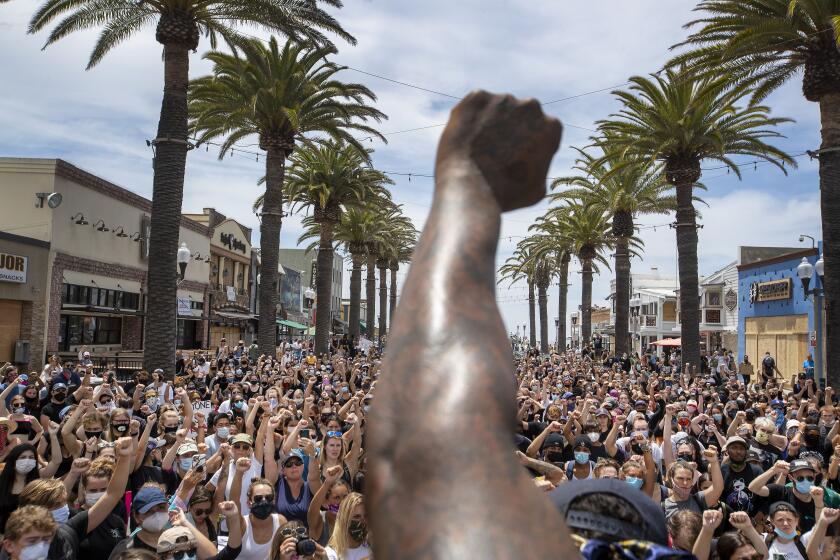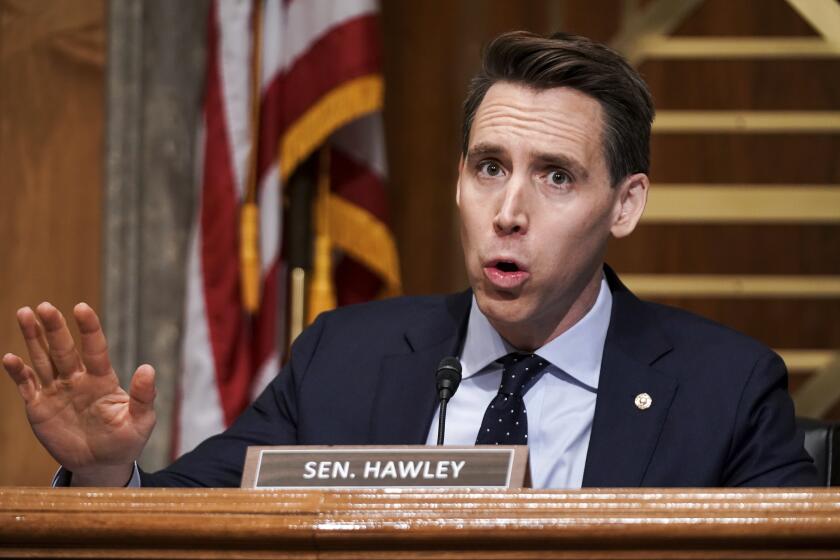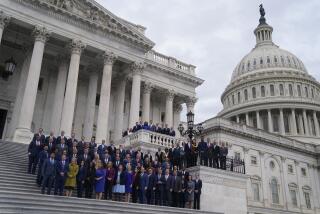How do we get to a more stable democracy? 6 writers chart a course
- Share via
In Conversation
How do we solve the disinformation crisis?
Martha Minow, Ayad Akhtar, David Kaye, Héctor Tobar, Annette Gordon-Reed, Jonathan Rauch.
If you buy books linked on our site, The Times may earn a commission from Bookshop.org, whose fees support independent bookstores.
As soon as the videos began streaming in on Jan. 6, it became clear that the nation was experiencing something unprecedented and dangerous but also, in many ways, unsurprising. The storming of the Capitol in the service of false conspiracy theories had no single cause, and no single Biden executive order can undo the threats and divisions it exposed. Which doesn’t mean we shouldn’t try to ferret out the causes and game out solutions to America’s disinformation crisis. By videoconference, The Times gathered six writers who have been examining these issues for years: Pulitzer Prize-winning historian Annette Gordon-Reed; David Kaye, the author of “Speech Police: The Global Struggle to Govern the Internet”; Harvard Law School professor Martha Minow; Jonathan Rauch, author of the forthcoming “The Constitution of Knowledge”; Pulitzer Prize-winning playwright and novelist Ayad Akhtar; and journalist and author Héctor Tobar. In a conversation edited for clarity and length, they tried to chart a course toward not just a more stable democracy but a better country.
Joe Biden is inaugurated hours after his predecessor leaves the White House, clearing the way for a beleaguered nation to turn the page on one of the most divisive chapters in its political history.
The attack on the Capitol has so many root causes, and we have to understand them before addressing them. What do you think is the most important cause?
Héctor Tobar: We have to start with income inequality. Los Angeles has this reputation as becoming the Bombay of the United States — rampant inequality, homeless camps. It takes a toll on the psyche. We’ve seen this disinvestment in the American middle class and at the same time a lack of theories and ideologies of why this is happening. I just recently traveled across the country and talked to all different kinds of Latino people who are searching for answers, and they grab on to what’s available to them. They‘re looking for stories that explain why life is a struggle.
Annette Gordon-Reed: I would add the loss in status of whites, particularly white males. The talk about political correctness is a cover for this deep concern about a loss of status. Income inequality is part of it, but there’s a group of people like the lawyer couple standing on their lawn with the guns — that just feel lost. The New York Times asked a group of people to suggest books for President Biden. I suggested W.E.B. DuBois’ ”Black Reconstruction [in America],” because we’re in a moment where there are people who fear the growing political power of minority groups and Black groups in particular. And this has been a problem from the era that I studied, the early American republic: Who are the folks who count? One thing that could be done about it would be for the government to actually be efficient, to actually work. We’ve become anti-government since the 1980s. And we have this entity that we pay taxes to that’s not supposed to do anything.
Jonathan Rauch: My colleague Carol Graham at Brookings and her colleagues, they find that consistently African Americans are the most optimistic and hopeful people in America. Guess who’s not? Whites, especially working-class whites. The biggest root causes are not the easiest to fix, unfortunately, but I think there are two. One is extreme partisan polarization, especially on the right, which paves the way for propaganda to take root. And the second is the rise, actually before social media, of conservative media.
Martha Minow: The Republican Party in particular for 50 years has bet on these divisions. We’ve seen this, sadly, in other countries where there are the ingredients of status anxiety and economic inequality. The question is, what do the leaders do? If leaders appeal to those fears and amplify them, that is a toxic environment. I hate to be grandiose about it, but that has given rise to genocides.
David Kaye: For me, it’s two kinds of epistemic problems that we’re facing. One is, I don’t think that we have fully articulated as a society what freedom really means, and what community means, in a world in which we deeply value individual rights. We see this repeatedly in the way people articulate a freedom to do whatever they want, regardless of the impact on others. The other problem is a kind of epistemic governance problem. Particularly if we’re talking about social media, I don’t think we fully have grappled with the way public forums that are privately owned need to be governed, if at all. Maybe it’s just a failure of imagination.
Gordon-Reed: And it’s clear that the media doesn’t yet know how to deal with what we’ve seen on social media, or report on The Big Lie. I used to listen to Rush [Limbaugh] just to hear what was going on and go places where he was on radio all the time, just sort of this background noise — everyday people listening to this. It laid the groundwork for everybody having their own media, on Twitter or Facebook.
Walter Mosley, Luis Rodriguez, the coiner of #BlackLivesMatter and others sketch a hopeful future for L.A. and the U.S. after George Floyd protests.
Minow: Can I just add that there’s been a decimation of alternative sources of information. Local news is dying in America. And the social-media business model is predicated on outrage and attention. If you’re fed a steady diet of hatred, extremism, outrage — not information, not facts — and there’s not an alternative, who can blame people? But I think that art is really important. So please, Ayad, what can a playwright do to help us here?
Ayad Akhtar: Oh, my gosh, what a question. Nothing! We’re 40 years into an ideological molting in this country, which has enshrined the accumulation of personal wealth and the selling off of our national infrastructure. It maps against the ideological shift that David was talking about before, in which freedom ceases to have any legitimate political meaning. So individual rights on a racial basis or a 2nd Amendment basis are the only uncontestable values. I can’t imagine that a nation could be defined as a collective that is defined to protect individual rights alone. There must be some notion of a collective good. None of those things are questions that are being actively asked now for two generations. It’s hard, honestly, as an artist, to feel that the folks who are outraged and have no way to express it except to elect an imbecile and then show up to have their selfies taken as they’re killing police officers at the Capitol are really not justified in feeling irrationally disordered, disorganized, helpless and hopeless.
Minow: I just want to come back to something Annette said. There’s no “we.” There’s a destruction of a sense that “we” are in a project together. That’s what was violated so fundamentally on Jan. 6, that the people’s house was taken over by a group of people who felt it was theirs and not anyone else’s.
Tobar: “We” has always been a very tenuous thing in American history. But I think that the Democratic Party is very fortunate after what happened at the tail end of the Trump administration, because it’s giving the party a raison d’etre. It’s the antifascist party.
Given the scope of the conversation right now, is de-platforming the propagandists just a Band-Aid?
Kaye: To me, it actually is resonant with what everybody has been talking about, but especially this idea of, What do you do with voices that are able to manipulate the media? For a long time, we thought of this as a problem of foreign actors. Now we know this is about our own domestic environment. So when you look at something like de-platforming, which has got to be the word of 2021 — we’ll see how long it lasts. I think of it in two different ways.
One is: Look at the massive power of these platforms. Who’s responsible for making the decisions about what’s legitimate to say? We’ve given that authority essentially to billionaires. They make decisions on the basis, frankly, of their business model. Any of the solutions are going to be problematic. Either we are going to continue to reinforce the power of the platforms or we’re going to reinforce the power of government over speech. And then, we’ve had a society and a government where — this goes back to President Obama — we don’t hold the powerful accountable for their misdeeds, frankly. We didn’t do that after the Bush administration. And I wonder if we’re going to do it now. What we’ve seen is a company do it for us, in a sense.
Ayad Akhtar, author of the new novel, “Homeland Elegies,” talks capitalism, Trump and literary tokenism with “Conditional Citizens” author Laila Lalami.
Gordon-Reed: I think it was not a Band-Aid to take him [Trump] off Twitter. That made a big difference. On the other hand, I would love to have heard what he had to say about what happened afterward.
Minow: And there’s the challenge for law enforcement, because as people move from the visible platforms to less visible ones, it’s going to be much harder to have surveillance. I would step back even further and say that there’s an experiment that’s under enormous pressure here. Can you have freedom when you have enormous diversity and global economic power? At the moment, the private sector is providing a kind of check and balance when the government itself was teetering off course. So I can only be grateful for that, but we can’t leave the monitoring of these challenges to the self-interest of the investors. I think that we need something like a fairness doctrine, and we need the equivalent of a public internet.
Akhtar: I do fault the private sector: The primacy of shareholder value when corporations wield so much authority and create so much of the ethical infrastructure and are not accountable to anybody but their shareholders. I think broaching that conversation begins to smack of socialism to those who don’t understand what socialism is, so unfortunately these sorts of conversations are nonstarters.
Tobar: In addition to what everyone has been talking about, I think there’s a storytelling solution. Jonathan mentioned these statistics about Black and Latino optimism. I think that optimism comes because Black and Latino people have a story that helps them get through tough times — the resilience of our people. I taught at the University of Oregon, and 90% of the student body is white. My white students came from these really interesting places, small towns, logging towns. But they didn’t have any stories to explain where they came from that were as rich or as satisfying to them. American individualism had robbed them of their own story. What white rural and working-class people have done is, they filled in this need to explain with these mythologies, which are sometimes fantastical and ridiculous. They latch onto this crazy personality with the bad comb-over. So part of our duty is to concoct the stories that create the new “we.” And I think that’s going to involve a critique of capitalism.
Gordon-Reed: I’ve been very excited about what happened in Georgia, the huge rise in voter participation in this last election. Maybe we could start that story, that common “we,” by common collective action in electoral politics. Because people had taken the view that nothing mattered — my vote didn’t count. But in the Senate, you can see that actually made a difference. I personally don’t have a lot of hope in talking people out of these conspiracies, but we might be able to make a collective story by collective action politically, with the notion of government that is supposed to do things. The Democrats are the anti-fascist party — that could be the story.
Minow: I also think people are yearning to be part of something bigger. To the extent that I understand the people who stormed the Capitol, some of them seem to believe they were there for something bigger. People are looking for a cause. They’re looking, as Hector says, for a story — for meaning. There’s an opportunity for schools and leaders to help, to invite people to serve and to serve others. And to imagine a “we” that’s inclusive rather than divisive.
Kaye: I think we’ve been downplaying the responsibility of the Biden administration to really achieve concrete things over the next four years. If the administration sees itself as transitional and restorational, it’s a huge problem, and it won’t address these underlying problems we’re talking about. We’re going to need some exceptionally bold steps. Maybe there needs to be a new kind of domestic conscription. I’m not saying I’m in favor of that; I’m just saying there needs to be a call to service. Maybe it’s COVID-19 vaccination efforts and preparation for a pandemic in the future — or instituting a new kind of information ecosystem.
Simon & Schuster canceled “The Tyranny of Big Tech” over the Missouri Republican’s efforts to overturn election; Hawley threatens to sue.
Rauch: From where I sit in Washington, it’s not wise for Democrats to focus themselves on being anti-fascist and anti-capitalist. The votes they need are in the middle, and they’re going to have to have a positive agenda to help those people. There’s some good news on that score. The answers to these problems are going to come from places primarily outside of, for example, social media, and they’re going to involve depolarization. That’s hard, but Joe Biden has made clear it is going to be his mission. Public awareness of disinformation tactics is itself helpful in combating them. We’re doing much better. Journalists are getting a lot smarter about covering disinformation. I think that the social media publishers are doing a much better job than they did four years ago. I see a lot of trends moving in the right direction, and they don’t involve either heavy-handed government regulation or private regulation. They involve adaptation in lots of ways.
Gordon-Reed: Any time there’s been a change in technology — the telegraph or the printing press — people had to get used to the new medium and how to read it. We’re still pretty new on this, and so it’s not surprising that people are getting better at figuring out how to deal with it. As for Democrats being anti-fascist, you can be those things without using terms that set people off. You can model those values without actually calling yourself that.
Minow: Reinforcing what is a very nice turn to optimism in this group, I do think that something like youth service would be a great thing, including in the arts. Go back to the art dimension of the New Deal. Create opportunities for people of all ages to be expressive in constructive ways. TikTok is just such a window onto the pent-up desires that people have to create. Could it be supported and put to better purposes? I just think there is one fundamental issue by which to judge the next four years, which is, do people think that their children will live better lives than now? Right now a majority of people don’t think so, and until we can change that, there’s not going to be much hope.
It seems there’s a bit of a tension here between the hard truth of our challenges and the need to find a hopeful narrative. David’s book, “Speech Police,” included the sentence, “Fighting disinformation begins with governments telling the truth.” But how do we deliver it in a way that not only makes people believe that Q isn’t real but that climate change is?
Kaye: Let’s face it, the right is really good at storytelling. I think we need stories that are truthful. We’re all adults, and to speak to people with both a story and the idea that any choices we make going forward involve some kinds of trade-offs, that’s what adults do all the time.
Rauch: Let’s not forget that Donald Trump has been removed from office by the American people, despite six months of an unprecedented propaganda assault on our system. And let’s not forget that America will be back in the Paris Climate Accord. This is a real fight for epistemic integrity, for depolarization, for democracy, freedom, opposition to fascism and racism, but our side has a lot going for it.
Minow: It is uplifting to see decency back. Science is back. Maybe truth-telling is back. Maybe they were never there, but maybe these are aspirations. I think there’s a yearning again for hope, and for a better life.
The poet, essayist and author, most recently, of “Just Us,” discusses the evolving movement toward racial justice with Professor Marcus Anthony Hunter.
More to Read
Sign up for our Book Club newsletter
Get the latest news, events and more from the Los Angeles Times Book Club, and help us get L.A. reading and talking.
You may occasionally receive promotional content from the Los Angeles Times.










